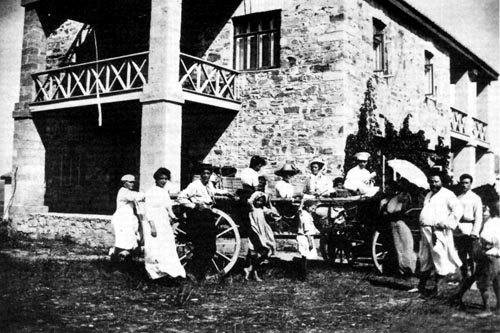-

Koktebel, Voloshin's house, Marina with hat on cart, Max Voloshin standing on the right
1911
Koktebel
Maximilian Voloshin's Haven in the Crimean
Seryozha
1911 - 1916
|
|
“Koktebel! Koktebel!
We reached it the first time on a creaking cart passing the wilds of
the Eastern Crimean. Only eight kilometers from Feodosia, but a whole
day's travel," wrote Marina. Asya would join her later. “The
landscape became more barren along the way until the earth was
covered only by black volcanic rock, which, at noon, burned your feet
through the soles of your shoes. We arrived at Voloshin's house and
behind it lay the ink-blue sea. No green, no tree, no bush, only some
tufts of high, bleached desert grass in a few sandy places. Stranded
on the rocks. Max Voloshin called it 'Homer's Island'. At night the
mythical heroes talked to us. We all went crazy, stricken by Greek
madness. I was nineteen and Marina seventeen when we spent our first
summer in Koktebel. We returned year after year before 1914.”
Marina had found her world, as uncompromising and as abstract as her
poetry.
|
|
|
Every guest was enthusiastically
greeted by Maximilian Voloshin and his mother “Pra,”
Yelena Ottobaldovna—the poetry of patronymics! Both dressed in
long Tartar caftans, barefoot. Max, he was only fourten years older
than Marina, a corpulent, genial philosopher. He wrote poetry and
painted. His widowed mother, equally voluminous, was a firebrand, the
soul of their guest house. They charged next to nothing for their
rooms. It was not yet a fashionable tourist spot. The guests prepared
their own meals or walked three kilometers to a ramshackle Tartar
café for food.
The motley crowd of greater and lesser
poets, painters, and revolutionaries all fell under the spell of
Koktebel, reading poetry to each other, critiquing their art,
collecting pebbles, nude bathing, making love in the warm transparent
sea, moonshine nights - real Greece not plaster Gods: Max Voloshin as
the conjurer and psycho-pomp. . . .
|
|
|
|
There Marina met Seryozha, Sergey Efron, her "Boy-Prince with the huge eyes", her shining "White Guard," emigrant, turncoat, informer, the father of her children, her husband in eternity, liquidated in Stalin's Gulag, her fate and destiny. . . .
|
|
Marina and Seryozha flew onto each other. She had found the beautiful prince of the fairy tales, who would deliver her from the shadows of her childhood. He was a year younger than she, barely eighteen. Their meeting gave Marina what her heart had longed for: romance, heroism, exalted feelings. Seryozha was not only beautiful, young, and innocent but so powerfully drawn to her, as if she alone could bind him to his life. They rushed into each others arms to overcome their loneliness by merging into each other. He called her his “enchantress”. For the first and only time in her life her sarcastic and her ecstatic aspects were at peace, her soul at rest in her love for Seyozha. For two years she was so filled with happiness that she wrote very few consequential poems.
|
Солнцем
жилки налиты
- не кровью
- |
Veins
filled with sun - not blood - |
Seryozha had a compromised family
background. His mother came from the aristocratic Durnovo family, his
father was Jewish. Both parents were active members of the “Black
Repartition”, a revolutionary group suspected of espousing
terrorist ideas. His mother had been imprisoned during the 1905
uprising. Seryozha, the youngest of six children, was too young to
have been part of his mother's revolutionary activities. His father
had died in 1909 in France and his mother had hanged herself a year
later. Marina and he had one thing in common, both had been orphaned
at an early age.
In January 1912 she and Seryozha got married.
They spent their honeymoon floating through Italy, France, and
Germany. In September 1912 Marina gave birth to their first child,
Alya-Ariadne, the carefully chosen name of the Greek goddess of the
Crimean. From the very beginning Marina indulged “in her little
shadow”. Like her mother she projected herself into the child
whole heartedly - a heavy burden for Alya.
|
Прелесть
двух огромных
глаз, |
...The
beauty of two huge eyes, |
In 1913 Marina and Sergey founded their own publishing company "Ole Lukoe " and printed a second volume of “youthful” poems: From Two Books. The disenchanted critics tore it to pieces: it contained the same kind of lyrics as Evening Album. They had expected her to exceed herself. Marina fell back to her nearsighted hauteur. The opinion of the world did not concern her.
|
|
|
They returned to Koktebel and Max's kind, olympian ministrations every summer until 1914. In 1914 facing a new fateful emotional upheaval she dedicated these lines to Seryozha:
|
|
In Moscow awaited them
the old drab every-day. Her father had been dismissed from his
directorship of the museum by the imperial minister. He,
nevertheless, doggedly worked on at no pay. Finally in 1912, a couple
of months before Ariadne's birth, the museum opened in the presence
of Emperor Nikolas II. Having witnessed Marina's happiness and
Ariadne's birth he died in September 1913 a broken man. In this
winter Marina and Seryozha fled to Feodosia where Asya, her newly
acquired husband and a little daughter had settled.
The
Efrons moved into an apartment of their own in Moscow on
6 Borisoglebsky Lane. The big house with all its memories stood
empty. The end of their childhood....